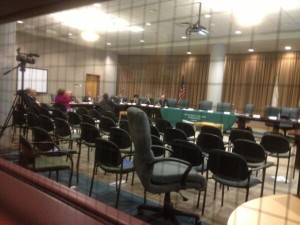 The Providence City Council officially urged the Board of Education last night to suspend its controversial NECAP policy.
The Providence City Council officially urged the Board of Education last night to suspend its controversial NECAP policy.
The Council passed a unanimous resolution last night asking the appointed board that makes education policy in Rhode Island to abandon its waiver policy and instead suspend the high stakes graduation requirement. It says:
There will remain many children are unable to qualify for a “waiver”, but whose academic achievement is no better or worse than other children who do qualify, including but not limited to such ineligible populations as children who plan to work after graduation, children who plan to attend the Community College of Rhode Island and children with individual education plans…
The population of children who cannot qualify for the “waiver” will be skewed towards the populations of disadvantaged children, including those in poverty, those with special education needs, and those learning the English language…
Here’s a link to the resolution.
Before the vote, Councilman Sam Zurier said,”The advocates of high stakes testing claim that they want to bring an end to ‘social promotion,’ but the new policy represents the worst kind of social promotion possible, sorting children with low test scores into two groups, namely a group with a college admissions letter and one without, giving a diploma and social promotion to the first group, and damaging the future of the second group even though both groups have the same test score.”
Here’s text of his full comments:
While the high school years bring many challenges, our children look forward to the milestone of graduation. At a ceremony with caps and gowns, and pomp and circumstance, an educational community and their families gather to reflect upon past accomplishments and to think of future possibilities, how we all can change our lives for the better with hard work and vision. When high school routines drag on, the image of graduation can inspire, like a shining beacon at the end of what at times may seem to be a four-year long tunnel.
On a single day in February last year, more than 1,000 eleventh grade students in Providence and more than 4,000 children State-wide saw their hopes for graduation diminish when they learned that they had attained a score of 1, or “substantially below proficient” on either or both of their NECAP tests, putting them at risk of being denied a diploma even if they passed all of their high school courses under the State’s new “high stakes testing” policy.
The simple fact that 4,000 kids, or 40% of our State’s 11th deemed ineligible for a diploma should have given the State Department of Education a reason to question the new policy. In fact, there were many other reasons, including that the authors of the NECAP test published instruction manuals specifically stating that the test should not be used for this purpose. If we viewed our education program as an ocean liner, we knew in February that the NECAP requirement was steering it towards peril. The February test result revealed the iceberg looming in the distance, but the captain of the ship refused to change course.
Instead, the State doubled down, reaffirming that the NECAP test was a valid standard for the minimum level of education every Rhode Island child should have, and those 4,000 students could still get their diploma by doing better on the next test. Despite its optimistic tone, this response contained a second, more ominous message: If any of those 4,000 children did not get a higher grade on the next test, they and the rest of the world would know that they had failed to gain an adequate high school education, and that they could take personal blame for that failure.
As the ship drew closer to the iceberg this summer, the State introduced a new, case-by-case waiver program that would require hours of paperwork by each individual student and his or her teacher to certify that they had received an adequate education notwithstanding their failure on the NECAP test. This onerous waiver process reaffirmed the NECAP’s role as the key indicator of adequate education, while creating a bureaucratic nightmare for schools and students that would divert massive resources into the new certification process while taking them away from the work of learning in the classroom, thereby reducing the quality of every student’s education.
Last month, all of this changed, when the State announced that any child who got only a “1″ on the NECAP could still get a diploma if they were accepted into a “selective” 2-year or 4-year college. While this change offered relief to thousands of children, the intellectual bankruptcy of this new “batch” waiver cannot be overstated. Everywhere else in the United States of America, colleges require students who gain admission during their senior year to graduate in good standing in order to preserve their seat at the college – if you do not get your diploma, you are not welcome to go to college next year. Here in Rhode Island, however, the cart has been placed before the horse; namely if a selective college admits you contingent upon your getting the diploma, the State will give you the diploma even if you fail the test. In contrast, students who plan to attend CCRI next year, will not have this opportunity if they get a “1″ on the test; while their wealthier suburban peers will be declared worthy of a diploma despite their low test scores, the children who wish to attend CCRI will be denied a diploma because of it.
The ironies only multiply from here. On Monday, the State Department of Education released a report stating that children who received a score of “1″ on the NECAP were unlikely to graduate from college. If the State truly believes this finding to be significant, then why in the world would it want to encourage children to attend college as a substitute for passing the test?
The advocates of high stakes testing claim that they want to bring an end to “social promotion”, but the new policy represents the worst kind of social promotion possible, sorting children with low test scores into two groups, namely a group with a college admissions letter and one without, giving a diploma and social promotion to the first group, and damaging the future of the second group even though both groups have the same test score. As the iceberg and shipwreck come closer and closer, the captain has issued life preservers to the passengers in the first group, while leaving the passengers in the second group to go down with the ship.
Here in Providence, we have a larger population of disadvantaged children, who deal with the challenges of poverty, learning the English language, special education plans, and the like. While the new “batch waiver” has brought relief to affluent families in the suburbs, in the urban core, the previous feeling of anxiety and dread intensify, all in the name of a mistaken policy that people refuse to change because they are unwilling to admit that they might have made a mistake.
We all make mistakes, and we can sympathize with the human reluctance to admit errors once they are made. What is sad, however, is that the State’s face-saving adherence to this invalid, non-policy riddled with arbitrary exceptions will bring even greater harm to the teachers and students in the Providence Public Schools. For this reason, I ask you please to vote in favor of tonight’s resolution, which asks the State to steer the ship of education away from danger by postponing its high stakes testing policy until the time when all Rhode Island children will have a fair and reasonable opportunity to meet a worthwhile academic standard.
 Steve Brown, executive director of the RI ACLU, sent word to Patrick Guida, a member of the Board of Education and chairman of the ad hoc committee studying high stakes testing, that confusion over the waiver process proves it’s high time to reconsider the controversial NECAP graduation requirement policy.
Steve Brown, executive director of the RI ACLU, sent word to Patrick Guida, a member of the Board of Education and chairman of the ad hoc committee studying high stakes testing, that confusion over the waiver process proves it’s high time to reconsider the controversial NECAP graduation requirement policy.


